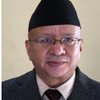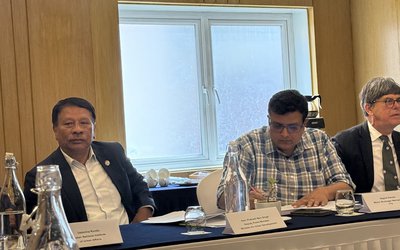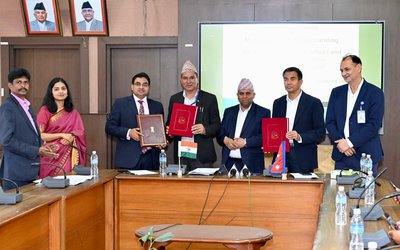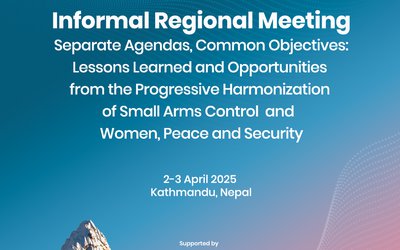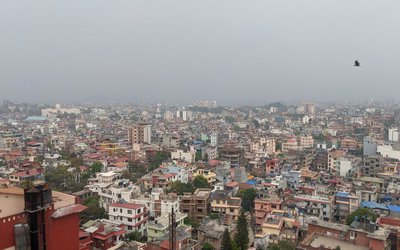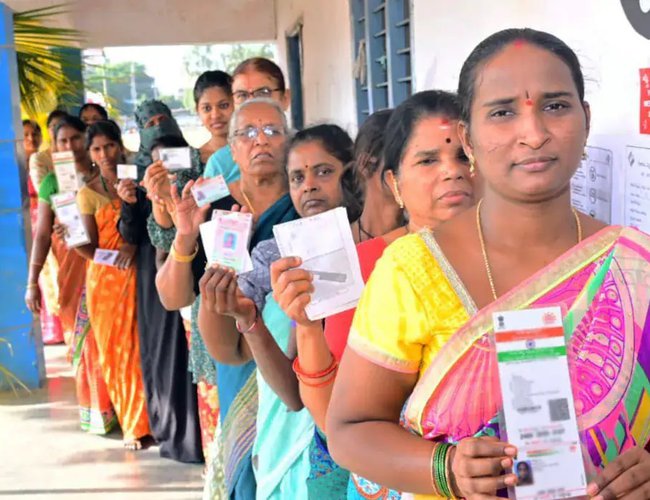
The general election of the Parliament or Lok Sabha is going on in the neighboring country of India. This election will decide which party will win the central government of India and who will be the prime minister. India is also the largest democratic country in the world. The opposition parties are saying that they are being targeted before the general elections to be held in seven stages from April to June in India, a neighboring country known as the world's largest democracy.
They are also alleging attempts at communal polarization, from the inauguration of a huge Ram temple in Uttar Pradesh's Ayodhya a few months before the elections, with the aim of using religion for political purposes.
According to the experts of Nepal-India affairs, Nepal has an open border of more than 1800 kilometers with India, and the debate going on there is being watched with interest and concern. India’s ruling party has invited eighteen political parties from 10 countries, including Nepal.,” to get fisrst had experience and insights into BJP elections campaign”. Apart from witnessing the election campaign, they will also meet India’s External affairs minster and other leaders. From Nepal BJP has invited representatives from the Nepali Congress, Janmat party, CPN-UML,CPN( Maoist Centre )and Rashtriya Swatantra Party.
At a glance, if the BJP comes to the government, the royalists in Nepal will be happy. In India's foreign policy, there is not much difference between the parties there towards Nepal.
In the past, during the Indian Congress government, even in 1989/90, a blockade was imposed on Nepal. A year later, some discomfort was seen in Nepal after the suspension of 500 and 1000 Indian currency notes.
Due to the lack of similar facilities in Nepal, Nepali people have lost a huge amount of money. Despite India's commitment, the Reserve Bank of India has not been able to resolve the issue with its Nepali counterpart Nepal Rastra Bank.
If he is re-elected, Prime Minister Modi will receive the report prepared by the Nepal-India Group of Eminenet Persons in the past, why could it not be done?
An expert group formed in 2016 prepared a detailed report on how to resolve issues related to bilateral relations, and completed its report in July 2018.
At first glance, since Modi first came to power in 2014, India's prime minister has visited Nepal four times, seemingly in line with his much-publicized "neighborhood first" policy. In view of the growing tension between India and Pakistan, the future of the 19th summit of SAARC (South Asian Association for Regional Cooperation) is also in question. Looking back at the ten years of Nepal-India relations during the Modi regime, it is noteworthy that Modi visited the Indian Prime Minister for the first time after 17 years.
Religious pilgrimages such as Lumbini, Janakpur and Mustang's Muktinath and Pashupatinath are noteworthy.
In 1997, the then Prime Minister IK Gujral visited Nepal. No two neighboring countries have such a close and complex relationship as Nepal and India.
Expectations of generosity are expected from India, which conveys the message that the international image of India, which is progressing in the direction of becoming a superpower, can be raised only through stability and development in its neighbours.
But for that, Nepal should be able to do the necessary homework and clearly state its issues. By advancing the agenda of economic prosperity, development and employment, no matter who is elected, it can have a very positive impact on neighboring countries like Nepal, which has an open border with India.
Experts argue that since many top leaders of the Indian Congress, Bharatiya Janata Party and other parties are familiar faces to Nepal, the political leadership here should take the initiative to take advantage.
Our leadership should try to win the goodwill of prominent leaders in India to address the problems seen in the field of Nepal increasing commodity exports, promoting infrastructure development and addressing marketing barriers in trade.
After the Indian elections, there are also those who hold the opinion that the power equation and tension in various issues will increase in Nepal and the possibility of political scenarios that have not been imagined cannot be denied, because the past is the same, but for the sake of Nepal's self-respect and the internal affairs of Nepal, Nepali people will do what Nepali people do now.
In the 77 years after India's independence, the Indian Congress seems to have ruled for 49 years. In the remaining 28 years, other parties and the last 10 years were ruled by Modi or BJP.
In the past, even when the Constitution of Nepal 2072 was issued, the Indian side pressurize to issue a favorable constitution. The Constitution was issued by the efforts of the Nepali people, but this Constitution could not fulfill their dreams.
Regardless of the party's government in India, Nepal should abandon the wrong neighbor policy of the past and adopt a policy of mutual benefit and respect.
Even in the past, the Ministry of Finance of Nepal did not study the positive and negative effects of India's interim budget on its economy and did not act accordingly.
Nepal Rastra Bank has also been studying the impact of the Indian budget for a long time, although it may not be public.
India is Nepal's largest trading partner with two-thirds of its trade dependent on India and any change in India's exchange rate, inflation, growth and other major economic and trade policies has a direct impact on Nepal's economy.
Expect that a working group involving senior officials of the Ministry of Finance has been formed to study the potential impact of the Indian budget and find ways to address it in the budget of the next financial year.
Nepal has close economic ties with India due to its open borders and recently stable exchange rate regime. Therefore, Nepal should regularly monitor India's economic policies and programs to get the maximum benefit from Nepal's economic partnership with the outside world under the effective management of the national economy and the national policy of liberalization and globalization.
With this, there is little chance of change in the exchange rate system in Nepal. It remains to be seen what Nepal will do when India moves towards crypto currency.
According to the International Monetary Fund, “The fixed peg of the Indian rupee has served Nepal well as it has sent positive impulses (growth/financial stability) from India; It has stabilized expectations and increased transparency; This avoids the impact of political uncertainty on exchange rate behavior.
Similarly, the inflation rate in Nepal has been determined by adjusting the prevailing prices in India to the exchange rate. Although this does not apply to all commodities at all times, the average level of prices, over a period of time, cannot vary significantly between two countries. In particular, economic growth rate, price and exchange rate, these three areas will greatly influence the policies and programs of the budget. Some believe that the South Asian Association for Regional Cooperation, the Bay of Bengal effort for multilateral technical and economic cooperation, and the winning party in India's general election will mean regional stability in the region. Bangladesh, Bhutan, India and Nepal need to take initiative. But whether Nepal will benefit directly from this activity can be a subject of discussion.
If Nepal fails to prove that it is a good investment destination, capital and investment may go to India. In Nepal, developing an enabling environment for infrastructure development is still a dream, and not good for doing business.
Domestic investors are also not satisfied, foreign investors are also being talked about. If there is an investment conference, it should be held every year.
Investment, infrastructure, hydroelectricity etc. conference should be held every year. In the context of Nepal, some people are of the opinion that the election results of India will have a minimal impact on Nepal's economy.
India's high growth rate can have a positive "spillover" effect on Nepal's overall development. In terms of attracting foreign direct investment, India is not a competitor of Nepal, because most of the investments in Nepal are in the hydropower and service sector rather than in the manufacturing sector.
Elections in neighboring India are important for the government and people of Nepal. It would not be an exaggeration to say that although the Indian Prime Minister Narendra Modi's government in New Delhi started the relationship with Kathmandu at a high level, at the end of his ten-year tenure, this relationship has returned to a satisfactory level.
During the 2014 election campaign, Modi had said that India's neighborhood policy should be based on mutual interests, shared prosperity and stability. During the election campaigns in Uttar Pradesh and Bihar, he advocated the use of Nepal's vast hydropower potential for mutual benefit.
Such statements indicate a possible increase in Indian investment in Nepal's hydropower sector. For this we have to keep our house in order and make a consistent policy towards investments from foreign countries including India.
There has been an agreement for the sale of about 10,000 megawatts of electricity, expect implementation The ongoing parliamentary elections in India have also given importance to the government and people of neighboring Nepal.
Indian Prime Minister Narendra Modi's government in New Delhi started the relationship with Kathmandu on a high pitch and Nepal has reviewed this ten-year tenure?
In the case of Nepal, it seems that the dominance of the left wing is increasing in politics due to the change of government, while in India, the Bharatiya Janata Party, which is considered a Hindu nationalist party, is getting stronger.
But it remains to be seen what the election results will show. In any case, should we be cautious and sensitive to the ongoing political movements in neighboring India?
Nepal has a lot to learn from India. According to some Nepalese experts and diplomats, they don't think that India's politics will directly affect Nepal.
In the past, even though the changes were made by Nepalis, there may be a psychological impact. What did Indian Prime Minister Narendra Modi do in Karnataka elections in the past? But he lost badly. Modi's image was constructed in such a way that it seemed that he was invincible, steadfast, immortal and indestructible. He has no choice. When he enters the field, he automatically clears the way. But the Karnataka election results are confusing people.
In India, unemployment and price hikes are causing the bottom line to suffer. Reports have surfaced that the number of poor in India is increasing while the middle class population is falling into the lower middle class.
The interest of the Indian private sector is not to invest in small projects, but in world-class projects. That opportunity is readily available with neighboring Nepal. They are clear that Nepal is a "virgin country" in terms of investment.
The roads that do not even lead to a way for India and China have become folkways for us.
Between the financial interests of India and China, there is no shortage of people who are of the opinion that we should once again demonstrate the ability to gain benefits, even if it is as a "by product".
- “Kolahalko Kolaj “: A Collection Of Scattered Memories By Prakash Sayami
- Apr 02, 2025
- Nepal-India Trade, Transit And Unauthorized Trade: Some Considerations
- Jan 16, 2025
- PM Oli’s Forthcoming Visit To China: Will The Achievement Be Complete?
- Nov 29, 2024
- Obituary To Dr. Mohan Man Sainju!
- Nov 02, 2024
- Donations To Political Parties: Some Reflections
- Oct 24, 2024
